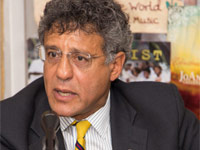A court of Appeal judge has raised the possibility that the former Chief Justice was not in accordance with the Constitution when he failed to deliver a judgment in open court – and that other judges may be continuing to use the same possibly unconstitutional practice.
Justice George Newman suggested that if this is the case, it may have significant wide-ranging legal implications.
In his August 10 written judgment relating to an application for an extension of time to appeal a judgment, made by former Chief Justice Sir Burton Hall, Justice Newman said there is a “strong arguable case” to be made that Sir Burton did not comply with the Constitution when he had his written judgment on a matter delivered to the Chambers of the two lawyers representing the individuals concerned, rather than reading it in open court.
Justice Newman allowed the extension of time to appeal, given that Wayne Munroe, the attorney for one of the individuals whose matter Sir Burton was deciding, said he did not receive the judgment until long after it was supposedly delivered and felt that the failure by the former Chief Justice to read the judgment in open court was unconstitutional.
In this regard, Justice Newman agreed that it is “an essential element of justice that it is dispensed in public.”
“The Constitution does not contemplate a procedure other than an announcement of the decision of the court in public. A pronouncement of the court means a pronouncement by a judge of the decision in court,” he stated.
Speaking of the act of sending the judgment to the lawyers rather than reading it in public in July, 2009, Justice Newman said: “A decision in respect to this practice is urgently required. The matter must be clarified as soon as possible.”
Furthermore; the Court of Appeal judge noted that “the urgency” of determining whether the practice is unconstitutional is “even more pressing” given that he got the impression “this is a practice which may well be continuing” based on information he has received.
He proposed that a full court will now “not only need to determine whether or not there has been what amounts to a non-compliance with the Constitution but also… what the consequences of non-compliance should be.”
One possible consequence, he noted, could be that there would be considered to be “no judgment at all” made by the judge in question in the matter or any others in which the purported judgment was delivered in this form.
In this case, Justice Newman said questions should be raised as to what extent the parties concerned are bound by the judgments reached when they are not delivered n open court.
“As I say, these matters, touching on civil rights obligations, are important,” he said. Justice Newman’s comments came with respect to an application, made by Wayne Munroe, attorney for applicant Alarice Maria Ifill, for an extension of time to appeal the judgment reached by Chief Justice Sir Burton Hall. The judgment related to divorce proceedings between Ms Ifill and Grantley Errol Ifill, the respondent in the matter.
Mr Munroe, applied for an extension of time to appeal the judgment after he and his client failed to receive the judgment in time to appeal it, as his client wished to do.
This, Justice Newman said, was because Sir Burton had had the judgment, delivered to Mr Munroe’s private Chambers at a time that he was relocating; offices due to the dissolution of his partnership with his former law partner, Elliott Lockhart.
“He did not receive the judgment at delivery or for some time after… It was upon receipt of the order of the court that Mr Munroe became aware of what had happened, namely what the judge had purported
to decide,” said Justice Newman.
The judge said that given the potential for Mr Munroe’s client to have been subjected to an application for his committal – to be confined to prison for having “failed to obey the order of the court drawn up on the basis of the document delivered as a judgment” – the issue was all the more serious.
He allowed the appeal for a extension of time made by Munroe on behalf of Ms Ifill stating that not only should it be allowed, but it must be “expedited.”
By: Alison Lowe
Source: The Tribune



